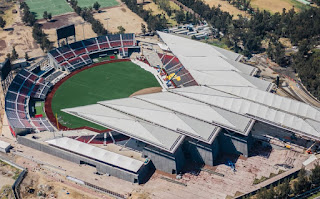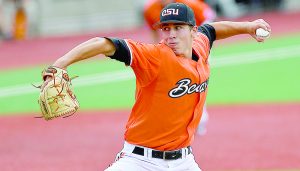 |
| Full house at Estadio Alfredo Harp Helu opener |
The man for whom the ballpark was named (after he provided all funding for its construction) was the Man of the Hour during pregame ceremonies. Also known as Don Alfredo, Harp addressed the capacity crowd by thanking the people who built the stands they were sitting in. "I want to thank the more than nine thousand people who participated in the construction of this dream, the construction of the home of the Diablos Rojos," Harp said. "With this, we show that we can do great things together. Mexico is a championship country and we will continue to be a championship country. I hope that together, we will enjoy our new home."
Mexican president Andres Manuel Lopez Obrador has practically become a ubiquitous presence at baseball events south of the border as a power-broker in the sport and an ally of billionaire Harp. AMLO was on hand for Saturday's opener and took part in the pregame ceremony. Although Puro Beisbol reports that many in the crowd booed the country's new leader, Lopez Obrador revelled in the moment, telling those in attendance, "We will support baseball, a sport that requires intelligence, heart and a lot of passion."
The game itself was almost anticlimactic and, for all intent and purposes, settled somewhat early. The Diablos took a 1-0 lead in the bottom of the third inning when Jesus Fabela (back from his trip to Japan with the Mexican National Team) scored the stadium's first run from third base on an Adonis Garcia sacrifice fly, but the Padres roared back with four scores in the top of the fourth to take the lead. San Diego scored four more times in the sixth, with a two-run homer by Michael Gettys giving the visitors an 8-1 lead and effectively salting the contest away. Despite the final 11-1 score, few (if any) attendees went home disappointed.
Prior to Saturday's game (the first of two played between the two sides over the weekend), a number of Mexican players with the Padres visited with players and coaches from the Liga Olmeca, a Mexico City youth baseball organization and Little League Baseball affiliate headed by Carlos Fragoso, who has scouted for both the Red Sox and Yankees over the years while building strong ties within Mexican baseball. In his Septima Entrada column for Solo Beisbol, writer Gilberto Ruiz Razo said that Esteban Quiroz and Luis Urias were among those San Diego players expected to spend time at the Liga Olmeca facility. Ruiz added that Fragoso is a longstanding friend of Monterrey Sultanes co-owner Jose "Pepe" Maiz, who was a member of Monterrey's 1957 Little League World Series champions (along with Hector Torres and Angel Macias) and instrumental in Liga Olmeca's later inclusion as an LLB affiliate.
LMP LEADERS DISCUSS EXPANSION DRAFT, PLAYOFF FORMAT
 |
| Guasave ballpark will see extensive renovations |
According to Puro Beisbol editor Fernando Ballesteros, MexPac president Omar Canizales was at Culiacan's Fiesta Inn Hotel with LMP league directors Hector Ley of Culiacan and Joaquin Vega from Los Mochis Caneros to confer with representatives from the league's two new franchises, the Monterrey Sultanes and Guasave Algodoneros. Although the Monterrey entry will be owned by the same Multimedios group that oversees the city's Mexican League club (along with part-owner Jose "Pepe" Maiz), the LMP version of the Sultanes will be operated separately from their summer LMB counterpart. Rosters will not carry over from one team to the other, although it's possible that some players may perform double duty without changing cities. Mexico's president Andres Manuel Lopez Obrador facilitated Monterrey's entry into winter baseball to partner with Guasave, where AMLO promised the return of the MexPac during his campaign last year.
The Algodoneros are partly owned by a group of Guasave businessmen who will operate the team, but they will be largely underwritten by Mexico City Diablos owner Alfredo Harp Helu. Harp will be funding the majority of an offseason renovation of Estadio Francisco Carranza Limon for 120 million pesos, which is approximately US$6 million. The ballpark was completed when Guasave joined the LMP along with Navojoa in 1970 and was used for 44 seasons (with some 2002 upgrades) before the original Algodoneros were sold to moved to Guadalajara in 2014. It'll be expanded from 8,000 to 10,000 seats in time for October's opener. The facility's traditional playing surface was smallish: Both foul lines are 305 feet away from home plate while the centerfield wall is a chummy 375 feet away.
Franchise fees for the respective new entries were considered with Guasave, the loop's smallest market, expected to have received a price break. An expansion draft was also discussed and a format comparable to when Arizona and Tampa Bay joined Major League Baseball was decided upon. Each existing Mexican Pacific League team will be allowed to protect 18 players on their current rosters.
Finally, the LMP playoffs were restructured into a three-stage competition involving the top eight teams. The league opted to align as a single entity of ten teams rather than split into two five-deam divisions while the 68-game regular season schedule was retained for 2019-20.
TOROS P BARREDA COMPLAINS ABOUT LMB'S NEW FRANKLIN BALL
 |
| Manny Barreda celebrates no-hitter for Caneros |
It didn't take long for one of a group of people whose success depends on what they throw to register his concerns. Tijuana pitcher Manny Barreda was quoted on the Hitazo site last Tuesday as saying the Mexican League had not sent the new balls to the Toros training camp in Tucson, Arizona yet. "It's difficult. It's not long before the season and we haven't really tested them," Barreda said. "We don't know how they look and we don't know how it'll feel in our hands. We don't know how it's going to work, like how our pitches will break."
A 30-year-old Arizonan who spent eight years as a reliever in the Yankees organization before becoming a starter with Los Mochis in 2016-17, Barreda subsequently authoring two no-hitters months apart in both the LMB and LMP (using 138 and 135 pitches, respectively). He was 5-3 with a 2.63 ERA in 11 starts for Culiacan over winter after splitting last summer between the rotation and the bullpen with Tijuana. The 5'11" righty does seem certain in advance of one likely feature of the new ball: "We do know it'll fly farther. It's the show that they (the Liga) want to give to the fans and we as pitchers will be affected.
Barreda doesn't think his fellow pitchers will easily adapt to the Franklin ball. "It's something very different," he said. "We've been pitching all our career with the Rawlings ball. It's thrown in the minor leagues, in winter and summer.
"Now that we have to change it, we're not very happy about that."















